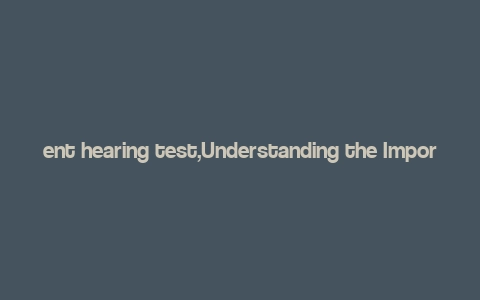Understanding the Importance of an ENT Hearing Test
When it comes to maintaining your auditory health, an ENT hearing test is a crucial step. This comprehensive examination, conducted by an Ear, Nose, and Throat (ENT) specialist, can help identify any potential hearing issues early on. In this detailed guide, we will delve into the various aspects of an ENT hearing test, its significance, and what you can expect during the process.
What is an ENT Hearing Test?
An ENT hearing test is a series of diagnostic procedures designed to evaluate your hearing ability. It is conducted by an ENT specialist, who is a medical doctor with expertise in the ears, nose, and throat. The test can help determine if you have a hearing loss, its severity, and the underlying cause.
Why is an ENT Hearing Test Important?
Early detection of hearing loss is crucial for several reasons:
-
Improved Quality of Life: Treating hearing loss can help improve communication, social interactions, and overall well-being.
-
Prevention of Cognitive Decline: Studies have shown that untreated hearing loss can lead to cognitive decline and dementia.
-
Enhanced Safety: Hearing loss can affect your ability to hear important sounds, such as alarms or emergency signals, which can put you at risk.
What to Expect During an ENT Hearing Test
During an ENT hearing test, your specialist will perform a series of evaluations to assess your hearing. Here’s what you can expect:
1. Medical History and Physical Examination
Your ENT specialist will start by reviewing your medical history and conducting a physical examination of your ears, nose, and throat. This helps identify any visible issues or signs of hearing loss.
2. Audiometry
Audiometry is the most common test used to evaluate hearing. It involves wearing headphones and responding to various sounds at different volumes and frequencies. The results are plotted on an audiogram, which shows the degree and type of hearing loss you may have.
3. Tympanometry
Tympanometry is a test that measures the movement of the eardrum and the middle ear’s response to sound. It helps determine if there is any fluid or blockage in the middle ear, which can cause hearing loss.
4. Otoacoustic Emissions (OAE) Test
OAEs are sounds produced by the inner ear in response to a sound stimulus. This test can help identify hearing loss in newborns, infants, and young children.

5. Auditory Brainstem Response (ABR) Test
The ABR test measures the electrical activity in the brain in response to sound. It is often used to evaluate hearing loss in infants, children, and individuals with severe hearing loss.
Interpreting the Results
After completing the tests, your ENT specialist will review the results with you. The audiogram will show the degree and type of hearing loss you have, as well as the frequency range affected. Based on the results, your specialist may recommend further evaluation or treatment options.
Treatment Options
The treatment for hearing loss depends on the severity and underlying cause. Some common treatment options include:
-
Hearing Aids: These devices amplify sound and help compensate for hearing loss.
-
Assistive Listening Devices: These devices can help improve communication in various settings, such as classrooms, theaters, and restaurants.
-
Medical or Surgical Intervention: In some cases, medical or surgical treatment may be necessary to correct the underlying cause of hearing loss.
Preventing Hearing Loss
Preventing hearing loss is essential for maintaining your auditory health. Here are some tips to help you protect your hearing:
-
Avoid loud noises: Prolonged exposure to loud noises can damage your hearing. Use ear protection when exposed to loud environments.
-
Protect your ears: Avoid inserting objects into your ears, as this can cause injury or infection.
-
Understand the risks: Be aware of the risks associated with certain medications, diseases, and occupational hazards.
In conclusion, an ENT hearing test is a vital tool for assessing your auditory health. By understanding the importance of this test and taking steps to prevent hearing loss